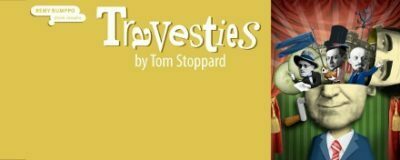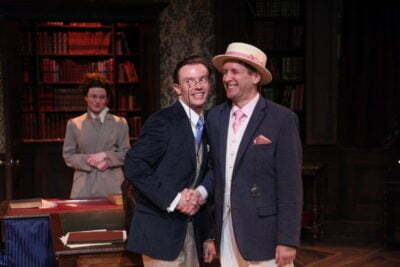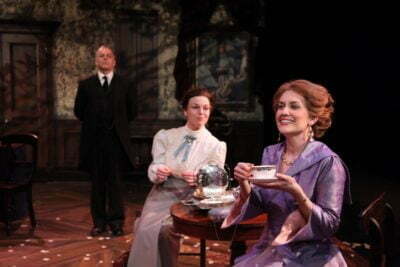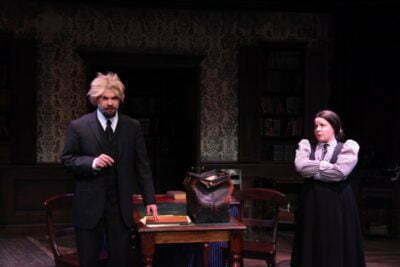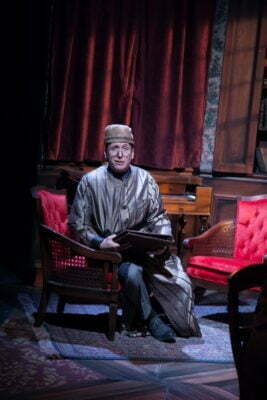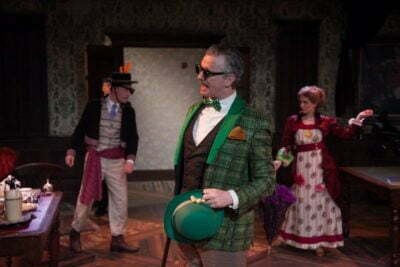Travesties
Directed by Nick Sandys
Produced by Remy Bumppo
At the Greenhouse Theatre, Chicago
Drama Packed With Modernist Themes
Remy Bumppo’s funhouse themed season culminates in a genre-bending meta-theatrical romp that demands an audience’s full intellectual engagement. Tom Stoppard’s 1974 play Travesties is an adaptation of The Importance of Being Earnest set in Zurich, 1917, with Tristan Tzara as Jack/Earnest, James Joyce as Lady Bracknell, and minor British consular official Henry Carr as Algernon. Meanwhile Lenin skulks about the edges of the plot, introducing political conflict between the characters that becomes a debate over the purpose and value of art. Nick Sandys’s production veers between Stoppard’s frantic vaudeville elements and philosophical arguments, creating as dizzying a whirlwind of ideas as we today associate with the World War I climate of revolution and chaos.
Carr (Jeff Cummings) claims in his old age on that he was at the center of a network of famous thinkers. His sister, Gwendolyn (Kelsey Brennan) was an acolyte of Joyce (James Houton), and gave him the idea of casting Carr as Algernon in a production of Oscar Wilde’s play, to show off English-language culture in this multilingual city. Carr agreed, despite having to supply his own fancy trousers. He also learned that the Dadaist Tristan Tzara (George Matthew Anderson) was in love with Gwendolyn, but had been using a fake name, “Jack Tzara” to keep his identity hidden from Lenin (Keith Neagle). For though Tzara greatly admired leftist revolutionary thought, Lenin agreed with Carr in his hatred for modernist art like Tzara’s poems. Carr is in love with Cecily (Meg Warner), a librarian who is fanatically devoted to Lenin, and therefore as an agent of the British government, he has no chance with. But since Tzara has left his real identity up for grabs, Carr gets the idea of impersonating him, and approaching Cecily as a fellow leftist in need of artistic re-education.
We learn all this despite frequent interruptions from the old Carr as he tries to remember whether he is getting his facts straight. Or, perhaps, he is telling a good story and trying to keep the facts out of the way. He frequently makes scenes start over once realizes they are not going the way he wants them to. Though the subjects debated are not dry and were at the time not strongly rooted in academia, Stoppard felt the need to break them up with clown shows and enhance them with verbal wit, and Sandys takes that dichotomy pretty far. There’s one scene in which someone performs a strip-tease while excoriating someone else’s politically incorrect artistic preferences (per Stoppard’s directions). It’s dramatically justified in that this is Carr’s semi-truthful recounting of a distorted memory, but removes any possibility for emotional connection with the characters. That’s not necessarily a bad thing, but prospective audience members should know how heavily this production favors brain over heart.
While Cummings is fun to watch and accomplishes several quick changes between his old and young self, he also naturally gets the worst of the divided nature of the play. I thought his portrayal of Carr was too buffoonish, given how Stoppard allowed him to make strong arguments. Carr got his job at the consulate after being wounded in battle, and he deeply resents Tzara’s attempts to cast him as a victim of fate, one of the ignorant millions of WWI soldiers who was forced or misled by his exploiters into a war against his fellow workers over nothing. Carr thinks Britain was in the right regarding Germany’s unprovoked attack on Belgium, and moreover, Marx was wrong about several key points and therefore his ideology is severely undermined. But then he goes back to simpering over his trousers and relying on his butler (Scott Olson) to think for him. Anderson, as an adorably feisty Tzara, much more easily transitions between farce and argument while maintaining manic energy. That’s partly the nature of his character, but his bouncy, impassioned delivery establish how seriously he takes his (anti)artistic ideals, making them an appropriate subject for drama. I loved the scene in which Houton’s dry Joyce interrogates him over the history of Dadaism, and congratulate Sandys for wringing so much humor out of a line as simple as “Good old Arp.” Sandys’s decision to allow Cecily to give a lecture on Leninism at the start of act two will work better when Warner articulates more clearly, but Neagle as the man himself sports a booming voice and arrogant, yet mesmerizing certainty.
Part of the tension between the serious and comedic is due to Stoppard straying from his story-telling device. While he gives directors the option of cutting Cecily’s monologue, there is no way to avoid Nadya Krupskaya (Jodi Kingsley), Lenin’s wife, from intruding into Carr’s narration with her own, in which she describes Lenin’s escape plan and things that happened to him before and afterwards. Stoppard has some fun with Lenin, but for the most part he’s a dark presence. Sandys prepared for this by having sound designer Victoria Deiorio and lighting designer Andrews Meyers insert explosions to accompany references to the war, some of which are quite jarring, and drive home that this isn’t all fun and games. But Lenin’s also used cheaply; in one scene in which Tzara points out he doesn’t have enough reason to care about Cecily’s opinion to go along with pretending to be Carr’s brother, Lenin cuts this line of thought off with a glare, allowing the plot to continue. Having read Hugo Ball’s diary, which is quoted in the Tzara/Joyce scene, I’m not sure whether I liked this play because it’s well-written, or just out of self-satisfaction for having understood it. And despite Sandys’s statement to the contrary, you really do need to know this era pretty well to understand the play. For those who do, there’s a lot here to like. For those who don’t: you’ll really need to read up on it, and should anyway, because it’s fascinating.
Highly Recommended
Jacob Davis
Reviewed March 30, 2015
This show has been Jeff recommended.
For more information, see Travesties’s page on Theatre in Chicago.
Playing at the Greenhouse Theater Center, Theater 3, 2257 N Lincoln Ave, Chicago. Tickets are $42.50-52.50; to order call 773-404-7336 or visit www.RemyBumppo.org. Plays Thursdays through Saturdays at 7:30 pm and Sundays at 2:30 om through May 3, with additional performances on April 8 and 29 at 7:30 pm and April 16 and 25 at 2:30 pm. Running time is two hours and forty minutes with one intermission.

